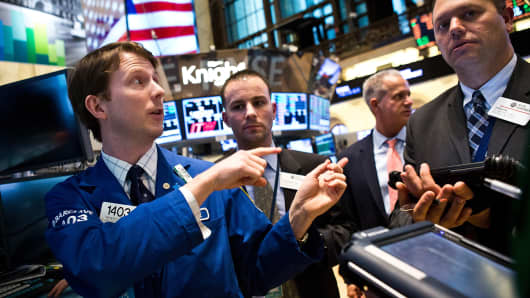September has been a good month for U.S. stocks—what happened to the "worst month of the year?" Take a look at September:
Major Indices MTD
Russell 2000 +3.9%
Dow Industrials +3.0%
S&P 500 +2.9%
Nasdaq +2.3%
Dow Transports -1.3%
What happened, of course, was central bank intervention and continued worries over Europe. Those two factors are what move stocks today.
The two biggest gains for the month occurred on Sept. 6 (European Central Bank President Mario Draghi bond buying), when the S&P 500 rose 2 percent, and Sept. 13 (Federal Open Market Commitee meeting), when the S&P rose 1.6 percent.
The biggest decline occurred this Tuesday, when the S&P 500 fell 1.1 percent on worries that the riots in Spain might derail the careful choreography of a Spanish bailout.
Bottom line: Shorting the market based on September being the "worst month of the year" has not proved fruitful. Blame it on Draghi and Bernanke. (Read More: September Bad for Stocks? Why It's Different This Time.)
By the way, the 1.3 percent decline in transports is very troubling; it's the third straight month of declines.
Elsewhere:
1) Another very popular investment strategy — Invest USA, you might call it — that makes sense on the surface is also not doing very well. This theory holds that the biggest risks are outside the U.S., that the U.S. economy will outperform the rest of the world, and therefore the right move is to buy U.S. stocks. For example: Go long consumer discretionary, go shortmaterials, which are heavily exposed to the global economy.
This would make sense in a normal world, but we don't live in a normal world. Central bank intervention has weakened the dollar, raising commodity prices, and so very large swaths of the U.S. stock universe are doing very well this quarter, with or without the weak global economy.
Major Sectors This Quarter
Energy 10.1%
Tech 7.8%
Telecom 7.6%
Consumer Discretionary 7.5%
Financials 6.8%
Healthcare 6.0%
Materials 5.1%
And so has other global stock indices, China being the exception:
Global Stock Indices This Quarter
Germany 13.1%
Brazil 10.0%
Spain 9.3%
S&P 500 6.2%
China -6.3%
Get it? In this environment, when the central banks have clearly demonstrated they can stay employed longer than you can, it seems foolish to create investment ideologies that are contrary to theirs. At least as long as they are playing the game. Endgame may be very different.
2) Today, Spain will release the results of an independent audit of its largest banks. How deep a hole are they in? Estimates of how much they will need to raise to recapitalize themselves vary, but 40 billion to 70 billion euros ($51 billion to $90 billion) is the range. (Read More: Spain's Bank Audit to Offer Launchpad for Aid Request.)
If this sounds ludicrously low given the bursting of the real estate bubble in Spain, you're right. It is ridiculous.
These low numbers are being explained away because: 1) some banks will be able to raise capital on their own (maybe); and 2) the banks are creating a "bad bank" that will hold off-the-book toxic assets. In theory, this means that bank bondholders will take a huge hit.
I say "in theory" because a lot of these bondholders are depositors, as well. How much pain they will accept is still up for debate.
The bottom line: Spain's estimates of how much its banks need to recapitalize will be wrong. They will be revised.
So will the estimates of its budget deficit and gross domestic product growth, both released yesterday with its 2013 budget. They too will be revised.
Why are we doing this? Spain is the middle of an elaborate choreography, all designed to elicit the most favorable terms for a bailout request. It was not an accident that the market rose yesterday when the Spanish economy minister, Luis de Guindos, said the budget they submitted was in line with European Union recommendations. That was what the market wanted to hear.
—By CNBC’s Bob Pisani
_____________________________
Bookmark CNBC Data Pages:
_____________________________
Want updates whenever a Trader Talk blog is filed? Follow me on Twitter: twitter.com/BobPisani.
Questions? Comments? tradertalk@cnbc.com



